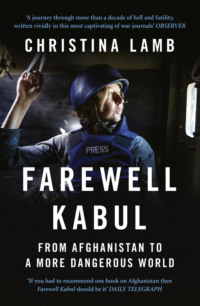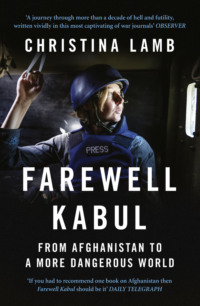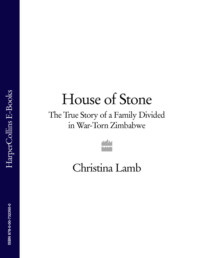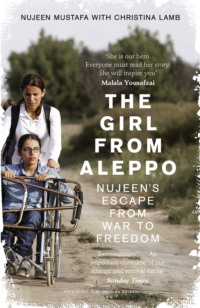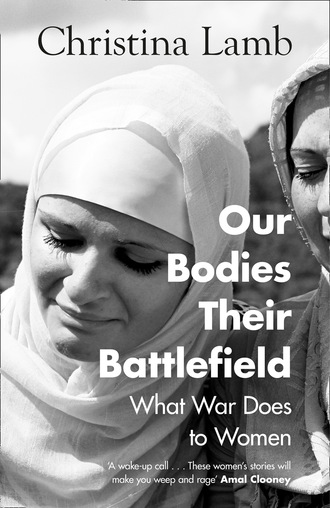
Полная версия
Our Bodies, Their Battlefield
A large plate of green melon was brought for dessert and the talk resumed as juice dripped down our chins. Afterwards, one after the other came and hugged me. ‘That’s the first time since all this happened that anyone has had a normal conversation with us,’ said Turko.
I wished I lived nearby to visit. In the car winding through the dark forests, I thought of her and Rojian back in their small rooms with their bad dreams and the children screaming in the night.
3
The Power of a Hashtag
Northeast Nigeria
The name Chibok is said to come from the sound of feet being sucked into swampy land. It was a small sleepy town in northeast Nigeria on the edge of the Sambisa forest with a narrow dirt road cutting through and a marketplace in the centre with a large telecom mast towering above. There was a church, a mosque, a Union Bank with a fading blue sign and door that had long been shuttered, and women and children pushing carts of yellow jerry cans, for there was no running water, and despite its name, the land around was bone dry and cracked for lack of rain. If you kept on the road to the edge of town, you would come to a large red-roofed building with the sign Government Secondary School.
On 14 April 2014, the night Boko Haram snatched her eldest daughter from this school, Esther Yakubu was in bed with her four other children in their simple concrete home. ‘Around 11 p.m. or midnight we woke to the sound of gunshots,’ she recalled. ‘My brother-in-law called and said Boko Haram is coming and we must flee. Boko Haram are butchers, everyone knows what happen when they come – they burn down homes, kill the men and take young women to be their bush wives.
‘I said I am not leaving my house but then we heard more shots and my husband insisted we must go, so we ran with the kids still in nightgowns and boxer shorts. Chibok is a rocky place and we hid among the shrubs and the crevices.
‘Boko Haram came and started setting fire to the marketplace and things till 4 a.m. We could hear them riding around on their motorbikes and see plumes of smoke but we didn’t know they had gone to the school.
‘Then my brother-in-law called again and asked “Where’s your eldest?” I told him she was at school. My Dorcas was sixteen and she was in the middle of exams and boarding there. He said the school had been attacked. I didn’t believe it but then parents started coming back and crying that the girls were gone. I still didn’t believe it – how could they take all the girls?

Esther Yakubu, mother of one of the missing Chibok girls (Justin Sutcliffe)
‘As daybreak came, around 5.30 a.m., we ran to the school. We saw the classrooms burnt, ashes everywhere and all the schoolbooks and backpacks and Bibles scattered about. I searched and searched for my Dorcas and screamed her name but she was nowhere.
‘Someone counted the missing. They had taken 276 of our girls. That day the whole community was in mourning like a tide of tears.
‘Then some of the girls started coming back. They told us that men had come into their dormitory at night and shouted to wake them up. The men were in army uniforms so they had not realised at first it was an attack. They had scrambled down from their bunk beds by flashlight. They saw the men were looting the foodstuff and were very young and scruffy and realised they were not army at all. Then they saw the buildings were on fire and screamed because they thought they were going to burn them alive. Then the men had ordered them onto open-top trucks and drove into the forest.
‘A few got away at the start and some others had managed to escape inside the forest by holding onto branches. I recognised one of the girls and I asked her, “Was Dorcas with you?” and she said “Yes, but she was tired in the truck so didn’t escape.” She was not used to running, maybe she was afraid.
‘My husband and other men went into the forest to try and search but it is huge and thick. Fifty-seven girls had managed to escape the first night but that left 219 somewhere in the forest with all the snakes and animals. Some people thought they had already taken the girls across the Gwoza Hills to Cameroon. Maybe they would sell them.
‘I kept looking at her picture on my phone, trying to will her back to me. I was thinking, How could this happen? I only just moved her from Kano to this school in Chibok because I thought it was safer.
‘Some people in the village said this was what happens when girls were educated too much. [Girls like Dorcas were an exception in northern Nigeria where only 4 per cent of girls finish secondary education and two thirds are married by sixteen.] But she was always a bright one and I really wanted her to be educated so she could have a better life.
‘“Boko Haram” means “western education is forbidden”. Not long before they attacked a boys’ school at Buni Yadi and burnt fifty-nine boys alive. But we never heard anything like this.
‘It seems like they weren’t planning it as they didn’t have enough vehicles for all the girls so broke into some houses and took some. Some of those girls who came back said the fighters actually came into the school looking for cement and a brick-making machine to build their base. They said they were arguing about what to do with the girls and even suggested burning them.
‘You know some people say it’s a conspiracy. We usually have a hundred soldiers on duty in Chibok because of all the attacks in the area but that night there were only fifteen as some had been sent elsewhere, and there were only twenty-seven police, most of them were drunk. The school had no light that night as the generator had run out of diesel. The headmistress was a Muslim and just two weeks earlier the school had a drill because of warnings of an attack and the principal told the girls to stay together in one place if anything happened. If they had run away they might have escaped.’
In his big white villa in the modern capital Abuja, the Nigerian president Goodluck Jonathan did nothing. Thousands of girls had been disappearing from villages across northeast Nigeria. The capture of the Chibok girls might have just been one more in a catalogue of Boko Haram atrocities, except for one thing. On 23 April 2014, nine days after the abduction, a commercial lawyer called Ibrahim Abdullahi was in his hotel room in Port Harcourt, packing to go home to Abuja, and switched on the TV. A live broadcast was underway from Port Harcourt Book Festival and Oby Ezekwesili, a former education minister, was speaking. She told the audience about the abduction of the girls, urging them to demand the government to ‘bring back our daughters’.
Abdullahi was a regular user of Twitter so tweeted Oby’s words and added two hashtags #BringBackOurDaughters and #BringBackOurGirls. He then rushed to catch his plane, thinking how devastated he would be as a father, were he to lose a child.
Across the world in Los Angeles, a film producer picked up the tweet. Within three weeks, the BBOG hashtag had been retweeted more than a million times worldwide. Supermodel Naomi Campbell, celebrity Kim Kardashian, US Secretary of State Hillary Clinton and First Lady Michelle Obama were among scores of high-profile people posting selfies of themselves holding placards bearing the words Bring Back Our Girls. With two teenage daughters of her own, Mrs Obama took over the president’s weekly radio slot to express her outrage. ‘In these girls, Barack and I see our own daughters,’ she said, adding that her husband had directed his government to do everything possible to help find them. In London, prime minister David Cameron told the House of Commons ‘this is an act of pure evil’ and pledged Britain would ‘do all it can’.
The US flew in CIA analysts and FBI hostage negotiators as well as Predator Drones they called ‘eyes in the sky’. An Intelligence Fusion Cell was set up with Britain and France sending in military advisors and satellite specialists, though a promised RAF Sentinel spy plane was delayed after it broke down.
Like journalists all over the world, I was told by my editor to get a visa and jump on a plane. Suddenly the Nigerian Foreign Ministry was inundated with requests from media outlets apparently falling over each other to cover the World Economic Forum on Africa taking place that week in Abuja. I felt the familiar rush of breaking news as we piled off the plane into the sticky airless heat, then jumped into taxis into the strange modern capital to find a forest of satellite dishes marked CNN, ABC, CBS, BBC, ITN, Sky, Nippon TV … For the next ten days the abduction of the Chibok girls led news bulletins the world over.
At sundown every day, crowds of journalists would emerge from the Hilton and cross the road to Unity Fountain, a dusty traffic island with a non-running fountain inscribed with the names of Nigeria’s thirty-six states. As flocks of birds silhouetted in black V-shapes against a reddening sky, campaigners dressed in red would gather to applaud the bustling Mrs Ezekwesili as she and others protested the lack of government action.
After each speaker a chorus would start up:
What are we chanting?
Bring back our Girls!
What are we asking?
Bring Back Our Girls! Now and Alive!
As people drifted off into the velvety darkness, I went for coffee in a nearby hotel with Mrs Ezekwesili who had gone from being a government minister to Vice President of the World Bank and was a co-founder of Transparency International. She was very angry, even more so when part of the hotel ceiling came down onto her dress. ‘Without education I’d be just one more girl child forgotten and trapped in poverty,’ she told me. ‘How did we fail so badly as a society that we can have this wholesale abduction of our girls? This needs to be an awakening call.’
Oil-rich Nigeria had just overtaken South Africa as Africa’s biggest economy, something its government had been planning to show off in the heavily guarded Economic Forum. Instead, all the world seemed interested in was the missing girls. This must have been extremely annoying for President Goodluck, a former zoologist with a penchant for fedora hats. He spent the next nineteen days holed up in his official residence in Aso Rock and said not a word about the kidnappings nor did he call a meeting to plan a rescue. His military denied it had even happened. His wife accused the protesters of ‘playing games’. When the president was photographed dancing at a party rally, he was pilloried in an editorial in the New York Times as ‘shockingly slow and inept at addressing this monstrous crime’.* The plight of the Chibok girls and his apparent indifference seemed to exemplify a government only interested in enriching itself.
Occasionally some of the parents of the missing schoolgirls would be at the Unity Fountain vigil. It was there I met Esther, a smartly dressed woman of forty-two, who worked as a finance officer for Chibok local government. She showed me a picture on her phone of her daughter Dorcas, radiant in a turquoise long-sleeved dress that shimmered like a mermaid tail. The photo had been taken the very week of her disappearance.
‘You can see she loved fashion,’ said Esther. ‘We used to say she would tie her hair as nicely as the Yorubas – they are famous for it.

A photo of Dorcas on Esther’s phone (Justin Sutcliffe)
‘She’s like a little bit of my heartbeat,’ she added. ‘She’s a nice friendly girl, she is my main pillar. She always takes care of her younger siblings without being asked and cooks. She likes singing praises in the church choir and has a voice like honey.’
The family were all devout churchgoers. ‘Most of the people in Chibok were Christians and we lived in peace with our Muslim brothers until Boko Haram came.’
Like most of the girls at the school, Dorcas had been doing her exams. ‘She had done five papers. She always got good grades and studied hard. She wants to study business administration and be a lecturer.’
Four weeks after the abduction, a video was released by Boko Haram. It showed around 130 girls in black and grey hijabs under tamarind trees, holding their palms upward in prayer and reciting from the Koran. Although northern Nigeria is mostly Muslim, Chibok was a mixed community as Esther had told me, and many of the girls were Christian.
‘I abducted your girls,’ crowed Boko Haram leader Abubakar Shekau, cackling manically like an evil clown. ‘I will sell them in the market, by Allah. I will sell them off and marry them off.’
Esther scanned the video in vain for her shimmering daughter. What were they doing to her?
Any mother would be terrified. Boko Haram was the world’s deadliest terrorist group according to the Global Terrorism index, even if it did not receive the international attention of Al Qaeda and ISIS.
When I spoke to Nigerians there seemed considerable confusion about Boko Haram’s objectives. In Abuja I met a former MP who headed an anti-corruption network, but turned up in an Audi R10 supercar and sported a gold and diamond Rolex. He described Boko Haram as ‘a demonic sect capitalising on ignorance of religious beliefs to perpetrate Satanic activities’ and ‘mixed up with banditry and brigandry’.
Others claimed it was actually set up by the army or by northern politicians to create anarchy and derail Goodluck Jonathan, a southern Christian, and attain power for themselves. Or by southern Christian politicians to wrest power from the north.
Boko Haram was actually the movement’s nickname – its real name was the rather less catchy Jama’atu Ahlus wa-Sunna Lida’awati wal-Jihad or the People Committed to the Propagation of the Prophet’s Teaching and Jihad. But when the group started it had no name, leading some to call it the Nigerian Taliban.
Its founder was a baby-faced Salafist cleric called Mohammad Yusuf who in 2002 set up a madrassa in Maiduguri, the capital of Borno state, and named it after Ibn Taymiyyah, a Syrian who had advocated jihad against the Mongols in the thirteenth century. There, Yusuf taught that the earth was flat and denounced western education (boko) as haram.
Nigeria is Africa’s most populous country with around 200 million people and hundreds of languages and tribes. Almost half are Muslim, mostly in the north, which is dirt poor compared to the booming south, following years of unequal distribution of the country’s oil wealth compounded with economic mismanagement and looting by corrupt rulers.
It is also one of the world’s youngest populations, more than half under thirty. Among thousands of young men without jobs or hope, Yusuf’s preaching of radical Islam began to attract a following, particularly with fellow members of the Kanuri tribe. He and his acolytes toured the region in pick-ups stacked high with loudspeakers urging Muslims to ignore the Christian-dominated ‘government of thieves’ and follow Sharia law. The font of all this corruption, he raged, was the education system implanted by British colonialists.
Yet it was a law over motorbike helmets that really turned this into full-blown insurgency. Nigeria’s roads were among the most dangerous in the world so, in January 2009, the government made helmets compulsory in a bid to reduce the death toll. But many people refused to wear them, claiming they caused head lice, could damage women’s expensive hair weaves, or might even be used to cast magic spells on the wearer. Most thought it was yet another way for police to extort bribes.
The following month some of Yusuf’s members were at a funeral procession in another northeastern town called Bauchi when they were stopped by police for not wearing helmets. The confrontation quickly escalated and security forces opened fire, injuring seventeen people.
Yusuf called on his members to respond with jihad and launched attacks across the five northern states. These were brutally crushed by government forces, leaving around a thousand dead and many more imprisoned, including many of the group’s family members. In Maiduguri there were running battles in the streets. The military eventually caught Yusuf and handed him over to police custody where he was shot in the chest while ‘trying to escape’, they claimed. His bullet-ridden body was displayed to journalists.
The remaining leadership went underground and many thought the movement finished. But some ended up in jihadist training camps in Somalia, Mali and even Afghanistan, and around 2010 they re-emerged as a terrorist group under Yusuf’s former deputy, Shekau.
Shekau looked terrifying to me in the video with the hijab-clad Chibok girls. People used words like ‘psychopath’ and ‘delusional’ but nobody seemed to know much about him other than that he had married Yusuf’s widow. ‘He is Stalin to Yusuf’s Lenin,’ one British diplomat in Abuja told me. ‘He has walked the revolution and taken it in a particularly violent direction.’
Like Osama bin Laden, his preferred medium of communication to the world was through videos in which he usually cradled a Kalashnikov. Surrounded by masked lieutenants, he went off on hour-long tirades about anything from Abraham Lincoln to Queen Elizabeth II. ‘I enjoy killing anyone that God commands me to kill the way I enjoy killing chickens and sheep,’ he declared in one in 2012. ‘We will kill whoever practises democracy … Kill, kill, kill!’
The first to be killed were moderate Muslim leaders shot dead by teams of gunmen on motorbikes. Most of the group’s initial attacks focused on getting their members and families freed through jailbreaks, replenishing their ranks. They also began bombing churches, starting with two in Maiduguri on Christmas Eve 2010, then throughout the region, and they demanded all Christians leave the north. The following year they moved on the capital, bombing the police headquarters in Abuja then the United Nations building.
The 2011 collapse of the Gaddafi regime in Libya, memorably described in a British intelligence report as the ‘Tesco of the illegal arms-trade’, provided a ready source of weapons which poured into Niger and beyond.
By 2012, Boko Haram had become more indiscriminate, carrying out suicide bombings of mosques, bus stations, markets and hospitals across the region. True to their name they also burnt down schools and killed teachers, sometimes conscripting the boys to serve as lookouts and recruits. Other times they simply slaughtered them. Teenage boys were forced to dig trenches then line up to have their throats slit and fall in. One of their members was known as the Butcher, apparently because he could sever a spinal cord in one slice.
So ruthless were they that even Al Qaeda apparently saw them as too extreme. A letter from Shekau was among papers seized in the May 2011 raid by US Navy Seals on Abbottabad, in which Osama bin Laden was killed. In it he had requested a meeting with Ayman al-Zawahiri, bin Laden’s deputy, and to be ‘under one banner’. There was no reply.
To raise funds, Boko Haram raided banks, stuffing the cash into big chequered nylon holdalls known as Ghana-Must-Go bags. To arm themselves, they seized army guns, trucks and even tanks – some said these were sold to them by corrupt military. Soon they were focusing on territorial control, annexing towns and villages across the north to control 70 per cent of Borno state and create a Caliphate, as ISIS would later, though even more brutal. They killed and captured thousands and sent hundreds of thousands fleeing.
Attacking schools, particularly girls’ schools, was not unique to Boko Haram. Hundreds of schools had been bombed or attacked by the Taliban in Afghanistan and northern Pakistan, where, in October 2012, fifteen-year-old Malala Yousafazi had been shot on her school bus for campaigning for the right to study.
But one of Boko Haram’s particular trademarks was seizing young girls and forcing them to marry fighters. This was partly to secure loyalty from followers by providing wives for unemployed youth who had no prospect of paying traditional bride price. It was also to provide future members of the Caliphate, the girls treated as incubators to produce Muslim offspring. Women who were already pregnant with Christian babies faced having their bellies slit with a machete and the foetus ripped out.
It may also have been revenge for the detention by Nigerian authorities of their own female relatives. There were some reports that Shekau’s own wife and three daughters had been captured in September 2012 while attending a naming ceremony which was attacked by the military. Shortly after he issued another video warning: ‘Since you are seizing our women, you wait and see what will happen to your women …’
He added, ‘I would like you to know there is slavery in Islam, even during the battle of Badr the Prophet Mohammad took slaves,’ referring to the first military victory by Muslims in the seventh century over Meccans who outnumbered them.
Boko Haram was complicated and media attention-span short and the satellites were soon being packed up and journalists moving on to a new story, ISIS capturing great swathes of Iraq and Syria. The British Sentinel spy plane sent by Cameron was quietly moved on elsewhere. The FBI pulled out its hostage negotiators.
As for the girls, it was as if they had vanished off the face of the earth. The following year, in March 2015, President Goodluck Jonathan ran out of luck and became the first sitting president in Nigerian history to lose an election. His failure to find the Chibok girls and end the insurgency was one of the reasons.
The victor was Muhammadu Buhari who had ruled as a military dictator back in the 1980s. He had nine daughters of his own and told his troops that finding the Chibok girls was a priority of his first hundred days. But the deadline passed, Boko Haram attacks continued and attempts at negotiations with Shekau stalled. On 14 January 2016, President Buhari met with around 300 of the parents and told them his government had ‘no credible intelligence’ on the girls’ whereabouts or indeed whether they were even alive.
Esther often sent me devotional messages and I couldn’t get those girls out of my head. I knew that feeling of butterflies in my stomach when I woke in the early hours to find my teenage son’s bed still empty. Imagine knowing your daughter was in the hands of brutal killers and rapists.
A spate of suicide bombings across northern Nigeria by young women had started in June 2014, two months after the abduction. Many believed these were Chibok girls who had been brainwashed and trained to be killers or forced to become suicide bombers, their vests triggered remotely, though others argued the girls were too valuable to Boko Haram given their international profile.
I met a man in London who flipped open his Macbook Air to show me stomach-churning videos of three of them being raped over and over until their screams became silent Os.
‘Boko Haram make ISIS look like playtime,’ I was told by Dr Stephen Davis, a former canon at Coventry Cathedral, who was living in Perth, Australia, and had spent several years negotiating with Boko Haram members. ‘I met one girl who was gang-raped every day for a year.’
Between 2009 and 2016 they had killed more than 15,000 people, razed villages and forced more than two million to flee their homes. According to Unicef, they had also forced more than one million children from school, burning their buildings, killing hundreds of teachers and abducting thousands of boys and girls to work as cooks, lookouts and sex slaves. After being rebuffed by Al Qaeda, Boko Haram had affiliated with ISIS in 2015, becoming Islamic State West Africa.
And yet how could 219 girls be abducted and simply disappear? Dr Davis, who was himself a father of three daughters, was apoplectic. ‘I couldn’t believe you take so many girls and leave no trace,’ he said. ‘Think how many vehicles that means, yet they didn’t even leave a single wheel track and not one villager saw them pass. It’s totally beyond belief.’



